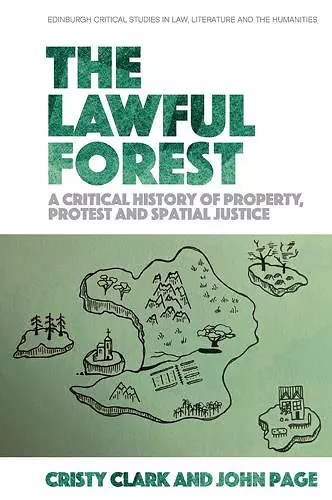The Lawful Forest
A Critical History of Property, Protest and Spatial Justice
John Page author Cristy Clark author
Format:Hardback
Publisher:Edinburgh University Press
Published:5th Aug '22
Currently unavailable, and unfortunately no date known when it will be back

Using the forest as a thematic device, Clark and Page explore the tensions that pervade our propertied relationships; between commodity and community, abstraction and context, and private enclosure and the public square. They draw on a range of case studies including the 13th century Forest Charter, Thomas More’s Utopia, the Diggers’ radical agrarianism, the Paris Commune’s battle for the right to the city, and Australian forest protestors of the late 20th and early 21st centuries. By analysing these movements and their contexts, Clark and Page illustrate the origin, history and legal status of the lawful forest and its modern-day companions. Although the dominant spatial paradigm is one where private rights prevail, this book shows that communal relationships with land have always been part of our law and culture.
The Lawful Forest is an important contribution to legal history, one that may alter perceptions of the natured history of law for those of conventional property scholarship as well as those more akin to critical property studies, decolonial and post-Marxist scholarship. The work is important for anyone working on understanding the history of the common law and its connection with property forms, where lost accounts of the shaping of black-letter law can be just as useful for a property law professor as for their students.The connecting of custom, nature and community in this text, offers an invaluable archive of all those past and future, in the task of a ‘figurative yearning for a spatial life lived better’ (39). -- Lucy Finchett-Maddock * The Modern Law Review *
The Lawful Forest is an important contribution to legal history, one that may alter perceptions of the natured history of law for those of conventional property scholarship as well as those more akin to critical property studies, decolonial and post-Marxist scholarship. The work is important for anyone working on understanding the history of the common law and its connection with property forms, where lost accounts of the shaping of black-letter law can be just as useful for a property law professor as for their students.The connecting of custom, nature and community in this text, offers an invaluable archive of all those past and future, in the task of a ‘figurative yearning for a spatial life lived better’ (39). -- Lucy Finchett-Maddock * The Modern Law Review *
This highly original and thought-provoking book takes a scholarly and eclectic approach to thinking about property. Its shift in analytical lenses reveals debates about resources and assets, combining theoretical and pragmatic insights to raise distinctive research questions. * Antonia Lanyard, University of Oxford *
ISBN: 9781474487443
Dimensions: unknown
Weight: unknown
248 pages